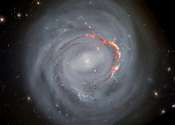New technique reveals the age of massive Southern Cross star
An international team of astronomers from Australia, the United States and Europe has for the first-time unlocked the interior structure of Beta Crucis—a bright blue giant star that features on the flags of Australia, Brazil, ...









